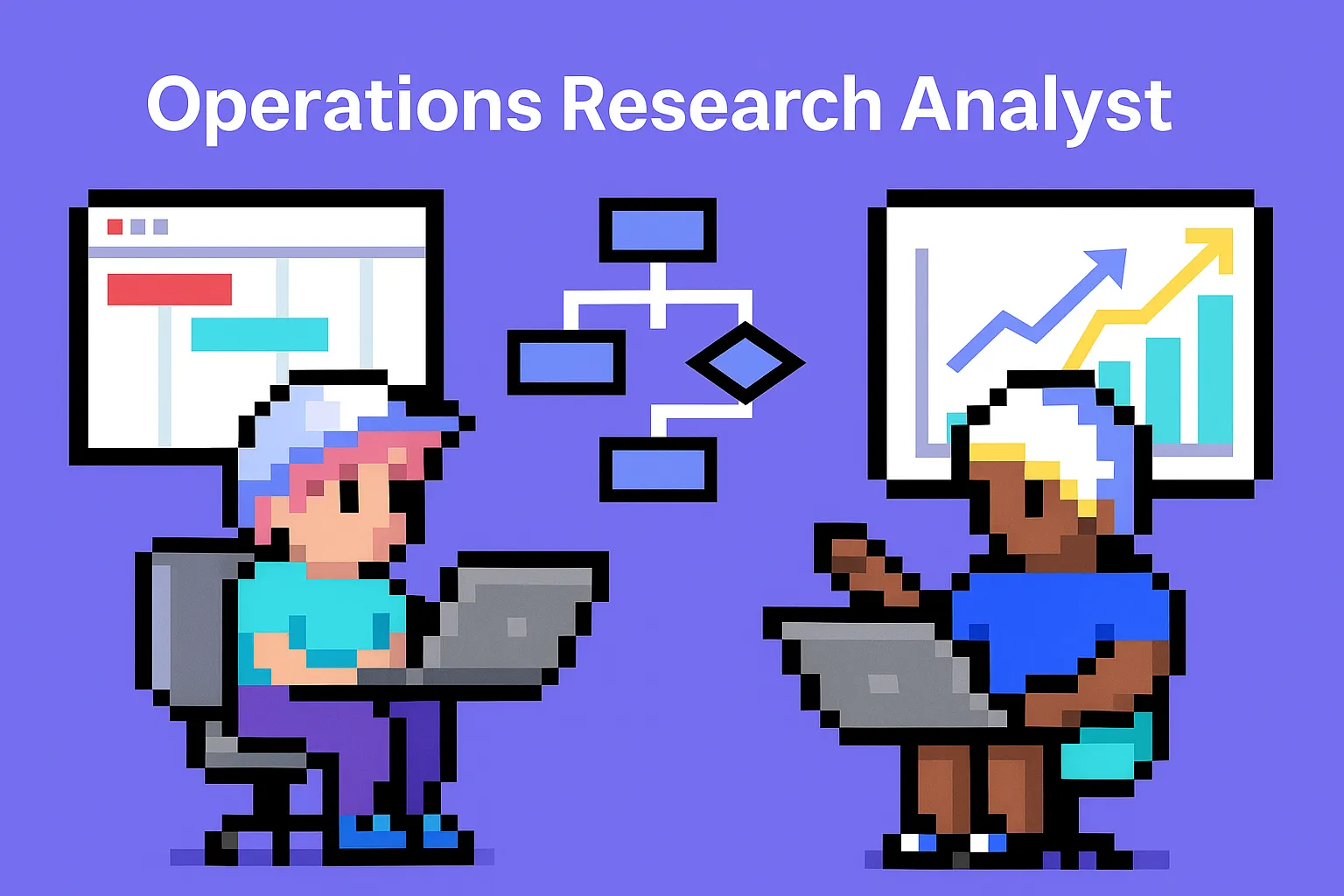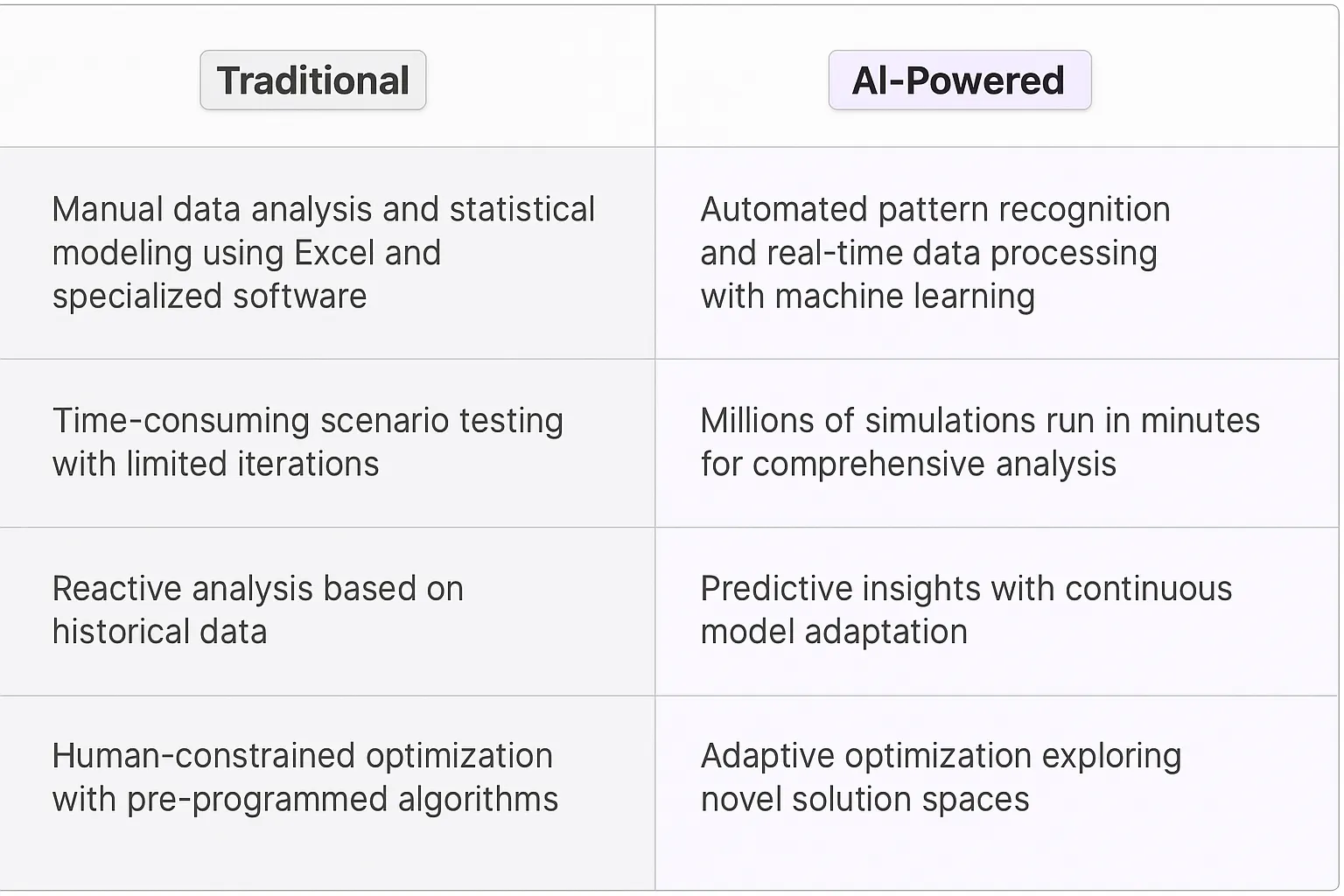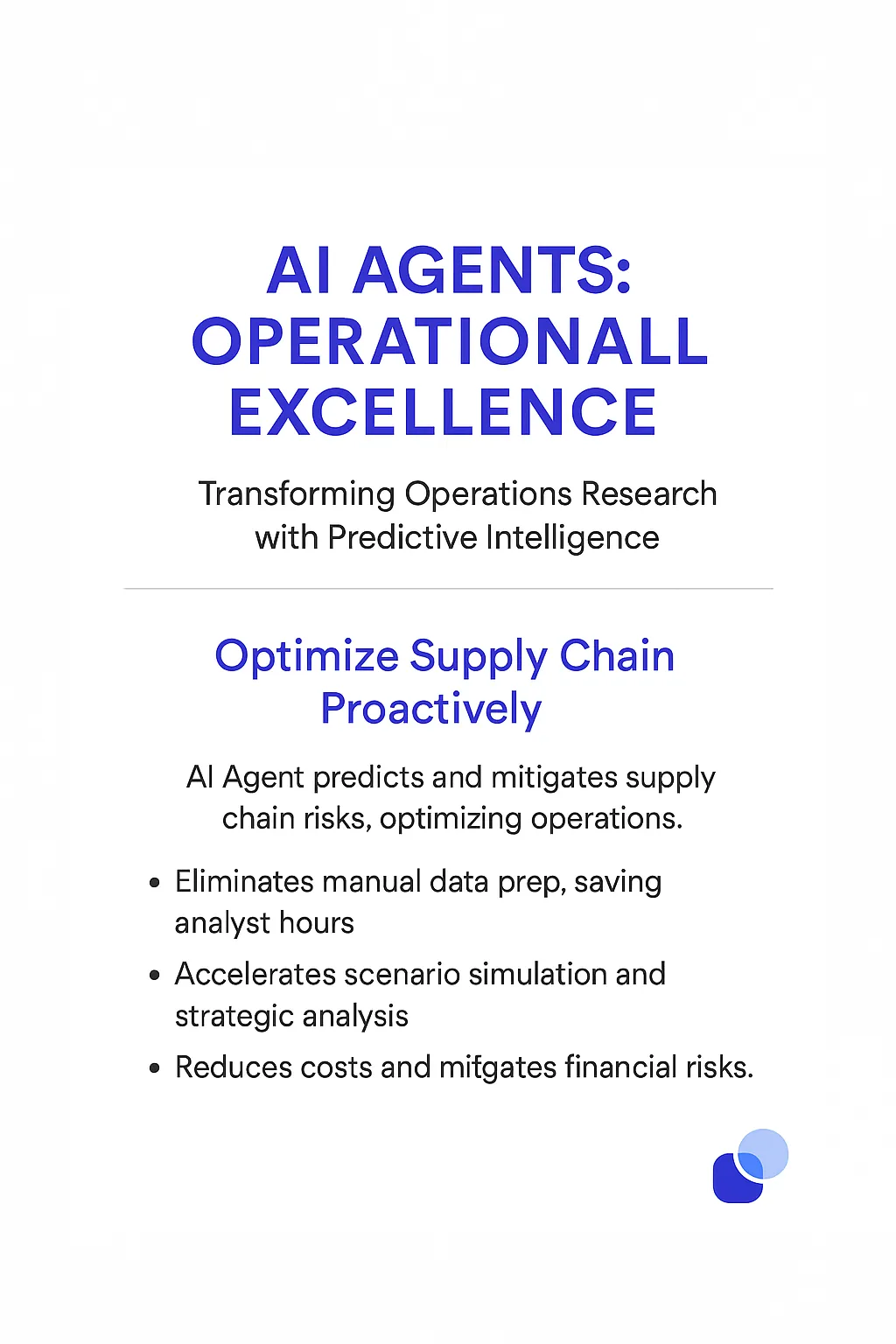Operations Research Analysts are the unsung heroes of efficiency in the business world. They're the wizards who use mathematical and analytical methods to help organizations solve complex problems and make better decisions. Think of them as the Sherlock Holmes of the business world, but instead of solving crimes, they're cracking the code of operational efficiency.
The toolkit of an Operations Research Analyst is diverse and powerful. They're masters of statistical analysis, able to wrangle data into submission and extract meaningful insights. They're also experts in optimization techniques, using linear programming and other mathematical models to find the best solutions to complex problems. Simulation is another key weapon in their arsenal, allowing them to test different scenarios without real-world consequences. But perhaps their most important feature is their ability to translate complex analytical findings into actionable recommendations for decision-makers.

Before AI agents entered the scene, operations research analysts relied heavily on traditional statistical models, linear programming, and simulation software. These tools, while powerful, often required extensive manual input and interpretation. Analysts spent countless hours wrangling data, tweaking parameters, and running scenarios – a process that was not only time-consuming but also limited by human cognitive capacity.
The old-school approach involved a lot of Excel spreadsheets, MATLAB scripts, and specialized optimization software. While these tools got the job done, they lacked the adaptability and learning capabilities that modern AI brings to the table. Analysts were the bridge between raw data and actionable insights, which meant their output was constrained by the hours in a day and the limits of human pattern recognition.
Enter AI agents – the game-changers in the operations research field. These digital teammates are like having a team of tireless, brilliant analysts working 24/7. They're not just crunching numbers; they're evolving, learning, and pushing the boundaries of what's possible in optimization and decision-making.
First off, AI agents can process and analyze vast amounts of data at speeds that make human efforts look like we're still using abacuses. They can spot patterns and correlations that would take humans months, if not years, to uncover. This isn't just about speed; it's about uncovering insights that were previously hidden in the noise of big data.
But here's where it gets really interesting: AI agents don't just analyze – they predict and prescribe. They can run millions of simulations in the time it takes a human to run a handful, allowing for more robust scenario planning and risk assessment. This means operations research analysts can now focus on high-level strategy and decision-making rather than getting bogged down in the weeds of data manipulation.
Moreover, AI agents bring a level of adaptability that traditional tools can't match. They can adjust their models in real-time as new data comes in, ensuring that insights are always based on the most current information. This is crucial in today's fast-moving business environment where conditions can change in the blink of an eye.
Perhaps most excitingly, AI agents are pushing the boundaries of what's possible in optimization. They're not constrained by pre-programmed algorithms; they can explore solution spaces in ways humans might never think to, potentially uncovering entirely new approaches to long-standing problems.
For operations research analysts, this means a fundamental shift in their role. They're no longer just number crunchers; they're becoming strategic partners who leverage AI to drive business decisions. It's a shift from reactive analysis to proactive strategy, from looking at what happened to predicting and shaping what will happen.
In essence, AI agents are not replacing operations research analysts – they're amplifying their capabilities, allowing them to tackle bigger problems, generate deeper insights, and create more value for their organizations. It's a partnership that's redefining the field of operations research and opening up new frontiers in optimization and decision science.

Operations research analysts are the unsung heroes of efficiency, constantly seeking ways to optimize complex systems and processes. AI agents are poised to become their new best friends, augmenting their capabilities in ways that would make even the most seasoned analyst's head spin.
These digital teammates can dive deep into data oceans, surfacing insights that might take humans weeks or months to uncover. They're not just number crunchers; they're pattern recognition wizards, capable of identifying trends and correlations that could revolutionize how businesses operate.
For instance, an AI agent could continuously monitor supply chain dynamics, predicting potential bottlenecks before they occur. It could simulate thousands of scenarios in minutes, allowing analysts to test hypotheses and strategies without real-world consequences. This level of rapid iteration and experimentation is a game-changer for operations research.
The task list for an operations research analyst AI agent reads like a data scientist's dream journal. These digital powerhouses can:
But here's where it gets really interesting. These AI agents aren't just performing tasks; they're learning and evolving. They're getting smarter with each analysis, each optimization, each prediction. They're becoming true partners in the quest for operational excellence.
The potential here is mind-boggling. We're talking about AI agents that can not only crunch numbers but also provide strategic insights. They might suggest novel approaches to problems that human analysts haven't considered. They could identify inefficiencies that have been hiding in plain sight for years.
And let's not forget about the time factor. These digital teammates don't sleep, they don't take coffee breaks, and they certainly don't get distracted by office gossip. They're always on, always analyzing, always looking for ways to improve.
The future of operations research is a symbiosis between human creativity and AI-powered analysis. It's a future where decisions are made faster, backed by more robust data, and lead to more efficient outcomes. It's a future where the impossible becomes possible, and the unimaginable becomes reality.
So, operations research analysts, get ready. Your new digital teammates are here, and they're about to take your game to a whole new level. The optimization revolution is just beginning, and it's going to be one hell of a ride.

The fusion of AI agents with operations research analysis is creating a seismic shift in how businesses optimize their processes and make data-driven decisions. These digital teammates are not just crunching numbers; they're reshaping entire industries. Let's dive into some concrete examples that showcase how AI is transforming operations research across different sectors.
From supply chain optimization in retail to patient flow management in healthcare, AI agents are tackling complex problems that once required teams of human analysts. They're not replacing humans, but rather augmenting our capabilities, allowing us to focus on higher-level strategy while they handle the heavy lifting of data analysis and scenario modeling.
What's particularly exciting is how these AI-powered tools are democratizing access to sophisticated operations research techniques. Small businesses that couldn't afford a team of OR specialists can now leverage AI agents to compete with industry giants. This leveling of the playing field is sparking innovation and efficiency gains across the board.
In the following examples, we'll explore how different industries are harnessing the power of operations research AI agents to solve real-world problems and drive tangible business outcomes. These aren't just theoretical use cases – they're happening right now, and they're reshaping the competitive landscape in ways we're only beginning to understand.
The logistics industry is ripe for disruption, and Operations Research Analyst AI agents are poised to be the game-changers. These digital teammates can crunch massive datasets, run complex simulations, and generate actionable insights faster than any human analyst.
Take a major e-commerce player like Amazon. They're dealing with millions of orders, thousands of warehouses, and a fleet of delivery vehicles that would make UPS blush. Traditionally, optimizing this behemoth of a supply chain would require an army of human analysts working around the clock.
Enter the Operations Research Analyst AI agent. This digital powerhouse can continuously analyze real-time data from every node in the supply chain. It's not just looking at historical patterns; it's predicting future demand, factoring in everything from weather forecasts to social media trends.
The AI agent doesn't just crunch numbers; it makes decisions. It can dynamically reroute shipments to avoid congestion, adjust inventory levels in real-time, and even suggest when to open or close distribution centers. It's like having a supply chain savant that never sleeps, never takes a coffee break, and never misses a beat.
But here's where it gets really interesting. These AI agents can simulate thousands of "what-if" scenarios in seconds. Want to know the impact of adding a new fulfillment center in Boise? The AI can model that. Curious about how a trucker strike in Germany might affect global operations? The AI's got you covered.
The result? A supply chain that's not just efficient, but adaptive and resilient. We're talking about reducing costs, improving delivery times, and enhancing customer satisfaction all at once. It's the kind of optimization that could give a company an unassailable competitive advantage.
This isn't some far-off future. The technology exists today, and early adopters are already seeing results. As these AI agents become more sophisticated, we're going to see a widening gap between companies that embrace this technology and those that don't. In the high-stakes world of logistics, that gap could mean the difference between dominating the market and becoming obsolete.
Let's talk about the finance industry, where every microsecond counts and billions are won or lost on split-second decisions. This is where Operations Research Analyst AI agents are about to flip the script on portfolio management.
Think about the typical hedge fund. You've got a team of quants burning the midnight oil, crunching numbers, and trying to spot patterns in a sea of financial data. It's intense, high-stakes work. But what if we could take it to the next level?
That's where our AI agents come in. These aren't your grandpa's trading algorithms. We're talking about sophisticated digital teammates that can process vast amounts of financial data in real-time, from market trends to geopolitical events, even sentiment analysis from social media.
But here's the kicker - these AI agents don't just analyze. They optimize. They're constantly running complex simulations, testing thousands of portfolio configurations against various market scenarios. It's like having a team of the world's best quants working 24/7, but at a scale that's simply impossible for humans.
Let's get concrete. Say you're managing a multi-billion dollar fund. Your AI agent is continuously monitoring global markets, news feeds, and economic indicators. It spots a potential opportunity in emerging market bonds. Within milliseconds, it's run hundreds of simulations, factoring in currency fluctuations, political stability, and correlation with other assets in your portfolio.
The AI doesn't just say "buy this bond." It gives you a precise recommendation on how much to buy, when to buy it, and how it fits into your overall risk profile. It's even factoring in the potential market impact of your own trades.
But it doesn't stop there. These AI agents are learning machines. They're constantly refining their models based on new data and the outcomes of their previous decisions. They're getting smarter every day, adapting to new market conditions faster than any human could.
The implications are huge. We're looking at a future where portfolio management becomes incredibly dynamic and responsive. Fund managers using these AI agents could potentially achieve levels of risk-adjusted returns that were previously unthinkable.
Of course, this raises some interesting questions. How do regulators keep up with AI-driven trading strategies? What happens to the role of human fund managers? And perhaps most intriguingly, what happens when these AI agents start competing against each other?
One thing's for sure - the finance industry is on the cusp of a major shift. Those who embrace these AI agents early will have a significant edge. It's not just about having better tools; it's about fundamentally changing how we approach portfolio management. The future of finance is AI-driven, and it's going to be wild.
Implementing an Operations Research Analyst AI Agent isn't a walk in the park. The tech stack required is no joke. We're talking about complex algorithms, machine learning models, and data processing capabilities that would make most engineers sweat.
First off, you need to nail the data integration. Operations research thrives on diverse data sources - from supply chain metrics to financial forecasts. Your AI agent needs to seamlessly pull in this data, clean it, and make sense of it. It's like trying to conduct an orchestra where every instrument is playing a different tune.
Then there's the optimization engine. This is where the rubber meets the road. Your AI needs to crunch numbers faster than a caffeinated quant on Wall Street. We're talking about solving complex linear programming problems, running Monte Carlo simulations, and performing sensitivity analyses - all in real-time. It's not just about speed; it's about accuracy and reliability too.
Let's not forget about the user interface. Your brilliant AI is useless if decision-makers can't understand its outputs. You need intuitive visualizations, clear explanations of trade-offs, and the ability to run what-if scenarios on the fly. It's like building a bridge between the world of abstract mathematics and practical business decisions.
On the operational side, things get even trickier. You're essentially asking your organization to trust a digital teammate with critical business decisions. That's a tough sell, especially in industries where gut feel and experience have long been the gold standard.
Change management becomes crucial. You need to convince seasoned professionals that this AI isn't here to replace them, but to augment their capabilities. It's like introducing a star player to a well-established team - you need to manage egos and ensure everyone plays well together.
Data governance is another minefield. Your AI agent will be handling sensitive business data. You need robust security measures, clear data handling protocols, and possibly navigate a maze of regulatory requirements. One data breach, and your fancy AI project could turn into a PR nightmare faster than you can say "GDPR".
Lastly, there's the challenge of continuous improvement. The business landscape is always shifting, and your AI needs to keep up. This means regular retraining, model updates, and possibly fundamental architecture changes. It's like trying to upgrade the engine of a plane while it's flying - tricky, but necessary if you want to stay ahead of the competition.
Implementing an Operations Research Analyst AI Agent is no small feat. But for those who can navigate these challenges, the potential rewards are enormous. It's not just about efficiency gains or cost savings - it's about unlocking new levels of strategic insight and competitive advantage. The question isn't whether AI will transform operations research, but who will be bold enough to lead the charge.
The marriage of Operations Research Analysis and AI agents is not just a technological advancement; it's a paradigm shift in how we approach complex problem-solving and decision-making. These digital teammates are amplifying human capabilities, allowing analysts to tackle bigger challenges, uncover deeper insights, and drive more value for their organizations. As AI continues to evolve, we're likely to see even more groundbreaking applications in fields like supply chain optimization, financial modeling, and healthcare resource allocation. The future of Operations Research is here, and it's powered by AI. Those who embrace this synergy will be at the forefront of innovation, driving their industries forward and redefining what's possible in the realm of operational efficiency and strategic decision-making.